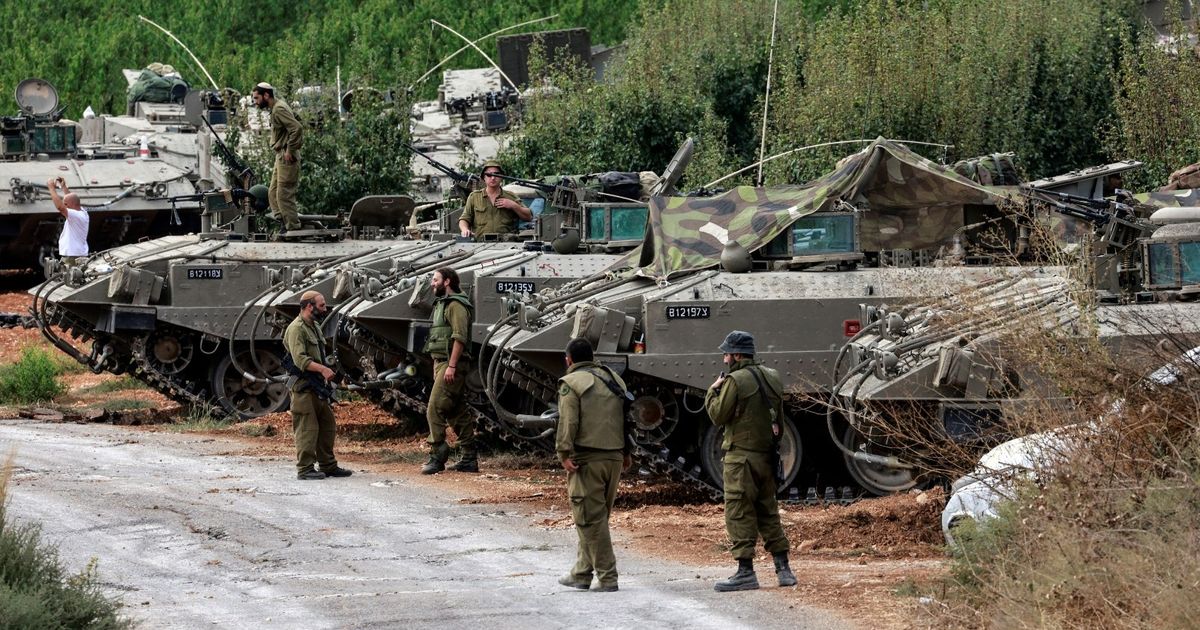On Sunday, the Israeli army accused the Lebanese Hezbollah of seeking “military escalation” in the border areas, warning of an attempt to “drag Lebanon” into the conflict in Gaza. Meanwhile, the Lebanese government announced an “emergency plan” as thousands began to flee, amid fears that the limited clashes would become a “total war.”
On Sunday, Israeli Prime Minister Benjamin Netanyahu warned the Lebanese Hezbollah, if it decided to go to war with Israel, of “unimaginable destruction for it and for Lebanon.”
Netanyahu said, in a statement issued by his office, that he “cannot yet say whether (Hezbollah) will decide to enter the war completely, or not.” Netanyahu addressed the Israeli forces, saying that the Gaza war is “life or death” for Israel.
The border region is witnessing an escalation, which is still committed to the applicable rules of engagement, while Israel evacuated dozens of residential communities in northern Israel, while thousands of people in Lebanon fled from the border region to the southern city of Tyre, and other areas.
Israeli army spokesman Jonathan Conricus said on the social media platform “X” (formerly Twitter), that “Hezbollah is aggressing and dragging Lebanon into a war from which it will gain nothing, but in which it may lose a lot,” adding that “Hezbollah is playing a dangerous game.” “Very much, it escalates the situation, we see increasing attacks every day.”
Conricus asked: “Is the Lebanese state really prepared to endanger what remains of Lebanese prosperity and sovereignty” for the sake of what he described as “Gaza ISIS.”
“emergency plan”
In Beirut, Prime Minister Najib Mikati said on Sunday, “The diplomatic contacts we are carrying out internationally and in the Arab world and the local meetings are continuing in order to stop the Israeli attacks on Lebanon and its south in particular, and to prevent the spread of the ongoing war in Gaza to Lebanon.”
He added, according to a statement issued by his office, that the government is working on developing an “emergency plan out of caution,” stressing, “But at the same time, we are reassured that the friends of Lebanon are continuing with us to make every effort to return the situation to normal and not develop it for the worse,” according to what was reported. National Media Agency Lebanese.
Deputy Secretary-General of Hezbollah, Naeem Qassem, said on Saturday: “We are concerned and we are part of this battle. Let it be clear: whenever events follow, and something arises that calls for our greater intervention, we will do so.”
Mutual bombing
On Saturday evening, the Lebanese National News Agency reported that there had been Israeli air strikes along the border, including near the towns of Alma Al-Shaab, Yarin, Al-Dhahira, and the outskirts of Aita Al-Shaab.
Hezbollah announced the targeting of several Israeli sites on the other side of the border and within the disputed Shebaa Farms.
On Saturday, the exchange of shelling left six Hezbollah members dead and a member of the Jihad movement, in addition to five casualties on the Israeli side, including three soldiers and two Thai agricultural workers.
The Israeli army announced that its forces “detected a terrorist cell trying to launch anti-tank missiles towards the Avivim area on the border with Lebanon,” noting that its forces launched “a strike on the cell before it could carry out the attack.”
Fighters from the Lebanese side also fired an anti-missile missile at an Israeli tank in the Shebaa Farms area, according to the Israeli army, which announced that there were no casualties or damage. It also said that it responded by targeting the “terrorist cell.”
Since the outbreak of fighting along the border, at least four people have been killed in Israel, three soldiers and one civilian, according to Israeli sources.
In Lebanon, the escalation has so far resulted in the death of 29 people, the majority of whom are Hezbollah fighters, in addition to five fighters from Palestinian factions, and four civilians, including a Reuters photographer.
Displacement and evictions
More than 4,200 people were displaced from villages in southern Lebanon due to border clashes, and local officials said on Friday that they were not prepared for a much larger mass exodus that could result from the limited conflict escalating into an “all-out war,” according to the agency.Associated Press“American.
About 1,500 displaced people are staying in three schools in the coastal city of Tyre, about 20 kilometers north of the border.
A joint statement issued by the Ministry of Defense and the Army in Israel, on Sunday, stated that Israel added 14 residential communities to the evacuation plan in its north.
The communities mentioned in the statement, which were approved by Defense Minister Yoav Galant, are located near Lebanon and Syria.
On Friday, Israel ordered the evacuation of the northern border town of Kiryat Shmona, inhabited by about 25,000 people, after repeated confrontations with Hezbollah fighters on the border with Lebanon.
“Worst escalation”
This is the worst escalation of violence on the Israeli-Lebanese border since the 2006 war between Hezbollah and Israel, according to Reuters.
For many of the displaced, the current tensions bring back memories of the brutal one-month war between Hezbollah and Israel in 2006, during which Israeli bombing destroyed large swaths of villages in southern Lebanon and on the southern outskirts of Beirut.
The Associated Press quoted Edward Bigbeder, representative of the United Nations Children’s Fund (UNICEF) in Lebanon, as saying, “Education will be one of the main casualties if the displacement is prolonged.”
He added that 52 out of 300 schools in southern Lebanon are already closed due to hostilities, forcing more than 8,000 children to leave education, in addition to those enrolled in schools that are now being used as shelters. A broader conflict would also threaten key infrastructure including electrical and, subsequently, water supplies.
Bigbeder continued: “In any escalation, children are the most affected. They are in a tragic situation.”
It should be noted that Hezbollah and Israel fought a devastating war in the summer of 2006, which left more than 1,200 casualties on the Lebanese side, most of them civilians, and 160 people on the Israeli side, most of them military. The war, which lasted 34 days, caused the displacement of about one million Lebanese from their towns, according to Reuters.
2023-10-23 23:27:46
#Gaza #War…an #emergency #Lebanon #warning #Israel #escalating #tension


